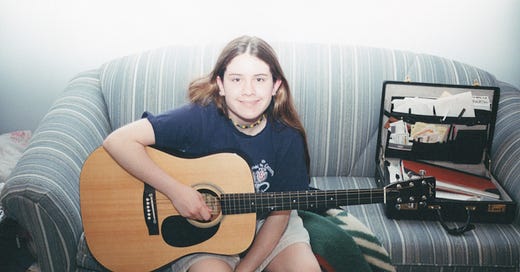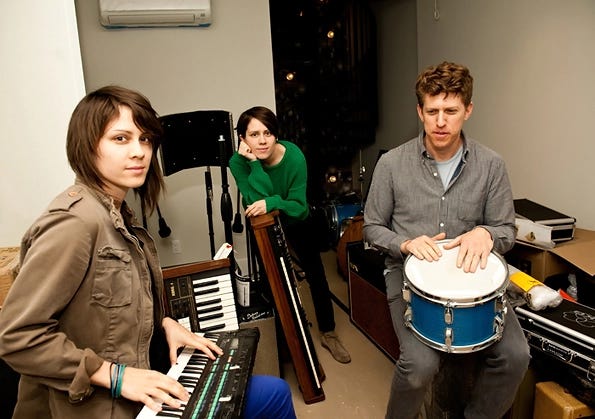Sara,
Have you been following this Taylor Swift and Damon Albarn story? If not, the gist is Damon Albarn said Taylor Swift doesn’t write her own songs in an interview with the LA Times (what a putz). When the reporter interviewing him argued, “Of course she does. Co-writes some of them,” Damon doubled down, saying, “That doesn’t count. I know what co-writing is. Co-writing is very different to writing. I’m not hating on anybody, I’m just saying there’s a big difference between a songwriter and a songwriter who co-writes.”
I think this moment in pop culture resonated so much with me because throughout our career I have felt that many journalists and musicians have credited our successes to men we worked with — as if we were just bystanders hit by good songs. The reality is we are the ones writing the majority of our songs, choosing the producers, and driving our direction with each album. Of course, this is something that happens to many female artists which is why this interview bothered me so much.
You and I are credited as co-writers on every single song we’ve ever released as Tegan and Sara, even though we don’t write most of our music together. I’m proud of that. We share equally in royalties and profit from our band regardless of who’s song streamed or sold the most.
Damon minimizes Taylor’s songs by pointing out that it took more than just her to write them. Which is absurd, since some of the biggest bands in the world co-write their songs together. Why is it any different that Taylor sometimes writes with other musicians? It also made me think, are we songwriters, or songwriters that co-write? It got me all tangled up. You and I are credited as co-writers on every single song we’ve ever released as Tegan and Sara, even though we don’t write most of our music together. I’m proud of that. We share equally in royalties and profit from our band regardless of who’s song streamed or sold the most. I don’t care if a song I wrote is mistaken for a song we wrote, or for a song you wrote. I am proud of what we do together. I think we make each other better, but I also respect the music you make on your own. I’m your biggest fan, I’ll follow you until you love me, papa, paparazzi. Just kidding.
What irks me about Damon’s comments is the suggestion that “a songwriter who co-writes” is in any way less valuable than one who doesn’t. Maybe because we’ve done both. And I don’t think a distinction needs to be made. Which is why you and I have never made it. All this got me thinking about how we tried to co-write together as teenagers but then we found out that writing with someone else is actually really, really challenging. It’s a deeply personal thing, and as adolescents, especially siblings who were keeping a lot of secrets about their sexuality from the world and each other, that made it hard to be open and collaborative with you. By 1997 we weren’t writing together anymore. The next time you and I co wrote together was nearly ten years later.
I wracked my mind for things I might have done wrong to get summoned. Was it because I was a Canadian volunteering during an American election?
It all started when I got a place in LA with Lindsey. It was in the lead up to the 2008 election; you and I had just finished touring The Con, and I was invited to the Warner offices to phone bank for Rock the Vote. I’d never been to the record label office without you; it felt weird to be there as just Tegan from Tegan and Sara. I was in the conference room dialing strangers to encourage them to vote when someone came in and told me the president of the label wanted to say “hi.” I wracked my mind for things I might have done wrong to get summoned. Was it because I was a Canadian volunteering during an American election?
Waiting outside his office door, my knees jiggled wildly. I felt nervous, like I’d been called to the principals’ office. Inside the well-appointed office, he and I sat together for a half hour talking about the election. He seemed pleased with how The Con, our first release on Warner, had sold. He was friendly, curious. When he asked what you and I were going to do next, I said we were going to write a new album right away. He suggested we might benefit from co-writing. It was said casually, like you might suggest a restaurant you recently ate at, or a movie you just saw to a friend. I was caught off guard, but he slid past his comment smoothly, and we finished our conversation and I left. Wringing my hands as I left the building, I felt regretful I’d taken a “meeting” without you and our managers. I tried to balance my anxiety by reminding myself that Warner had spent a lot of money to buy our entire catalog, including The Con and our next two albums. Clearly, he believed in us. But his suggestion that we consider co-writing didn’t sit well. Would he ask Radiohead to co-write? Or one of the other rock bands on the label fronted by men?
You decided that was going to be the story behind our sixth album. You were sure of it. We’d co-write the album together. Twist the narrative. Everyone thought we wrote Tegan and Sara albums together, but we never had. This time we would.
Around the same time as I had my “meeting” at Warner, you watched the Tom Petty Documentary Running Down a Dream. You wouldn’t shut up about it. You talked repeatedly about how cool it was to see Tom Petty writing with other artists. Somehow that turned into you and me writing an album together. You decided that was going to be the story behind our sixth album. You were sure of it. We’d co-write the album together. Twist the narrative. Everyone thought we wrote Tegan and Sara albums together, but we never had. This time we would.
You suggested a trip to New Orleans. Just the two of us. I warily agreed to go. When we were in New Orleans we fought a lot, but we also wrote half a dozen songs together. I got to play drums on all the songs, which was the only “fun” part of the trip for me. And I learned you often used other peoples lyrics as placeholder words until you hammered out a structure, only adding your own after you had a melody in place — which was a pretty cool hack. I often get hung up on lyric writing, but you’d mastered a work around. You used the Leonard Cohen lyrics from Came So Far For Beauty on a song we wrote together. We called the song Sainthood, which became the name of the album, even though we couldn’t get the use of Leonard's lyrics approved so we had to scrap the song. My takeaway from the experience was that songwriting in the same room with someone else was really boring. We were impatient, and we had such different ways of crafting songs, building our sessions in Logic, playing guitar. It was exhausting. I didn’t enjoy the process at all.
When we got home, I started experimenting in a program called Reason. It didn’t feel intuitive like Logic, so I struggled to be creative in it. I did manage to make one “song” before I gave up. It was an electronic feeling instrumental, industrial, frenetic, messy. I didn’t know how to navigate the interface and didn’t have the patience to do any tutorials, so it was just a series of keyboards and beats turning off and on. I couldn’t even figure out how to mute the click track when I exported it, so that was in there too, masquerading as percussion. Singing to the track felt like chaos.
“Must draw your own aid, must sift your affairs, must frame up, a material girl.” It’s still one of my favorite lyrics you’ve ever written.
Just as I was about to throw it away into the cast-off pile with other failed experiments, I sent it to you. The email sadly is long gone, but I imagine I just attached it and emailed it like any other business of the day. Do you remember? You probably wrote me back and said you’d take a crack at it. Or maybe your response was more significant? This was the first time we’d ever sent a track to write on to each other. Whatever you said, you obviously agreed to do it, since a few days later, you emailed back Paperback Head. I’ve always been envious of your writing, particularly, your lyrics. I don’t remember many specifics of receiving or hearing the song the first time, other than absolutely loving the lyric, “Must draw your own aid, must sift your affairs, must frame up, a material girl.” It’s still one of my favorite lyrics you’ve ever written.
When we released Sainthood in October of 2009, we included Paperback Head. A lot of the narrative around the album was about how we’d tried and failed at writing the album together. Journalists and fans were surprised to learn we didn’t write our songs together. But for all their surprise, there was little more than skin deep interest in Paperback Head, the one success we’d had together. We played it live briefly, eventually dropping it from the set and replacing it with songs from The Con and So Jealous. But I still love it.
In a way our trip to New Orleans was a failure; we weren’t very good at being “songwriters who co-write.” But we started doing it more after Sainthood, with dance artists, rock artists, and each other. And we’re getting better at it. I think? Some of our co-writing experiences (especially the ones with Tiesto, and Morgan Page) turned out to be quite fruitful, not just selling a lot, but opening up a whole new fanbase to our band. Critics received our collaborations positively, and that in no doubt inspired us to do more co-writing as we started work on what would be our sixth album, Heartthrob.

These days, I still find writing in the room with anyone, not just you, a total nightmare. So boring. So awkward. But I know that our experience co-writing has only enriched me as a writer; you push me to dig deeper, you can tease me and point out that I’m repeating myself, not trying as hard as I should, recycling ideas. So, I guess I’m left wondering if I prefer to be seen as a songwriter who co-writes or just a songwriter and why it matters — to me or anyone else. If you love a song, does it matter how many people wrote it? I am guilty of looking up who wrote a song from time to time. And I have marveled when I have searched a song to find it has only one writer, just as I have rolled my eyes when I’ve found fifteen contributors listed below something I enjoy. But it shouldn’t matter.
What do you think?
Oh, Piers emailed me the demo for Paperback Head. I’m attaching it to this email. It’s pretty dope.
Tegan




















Share this post